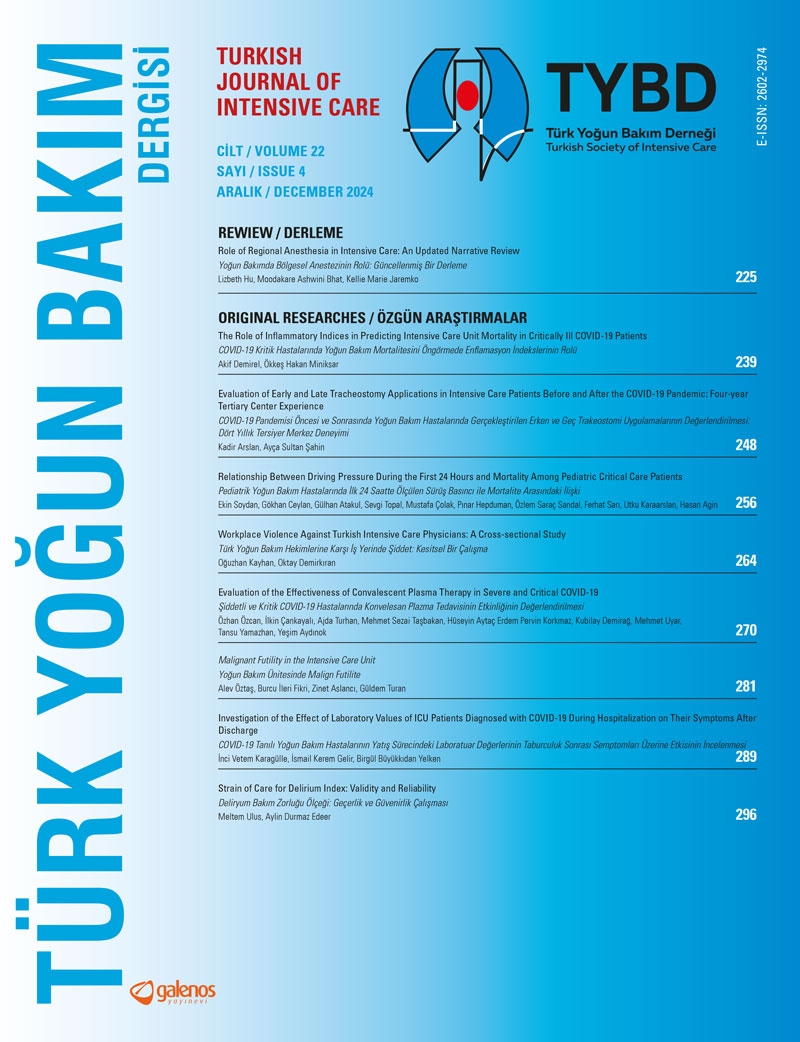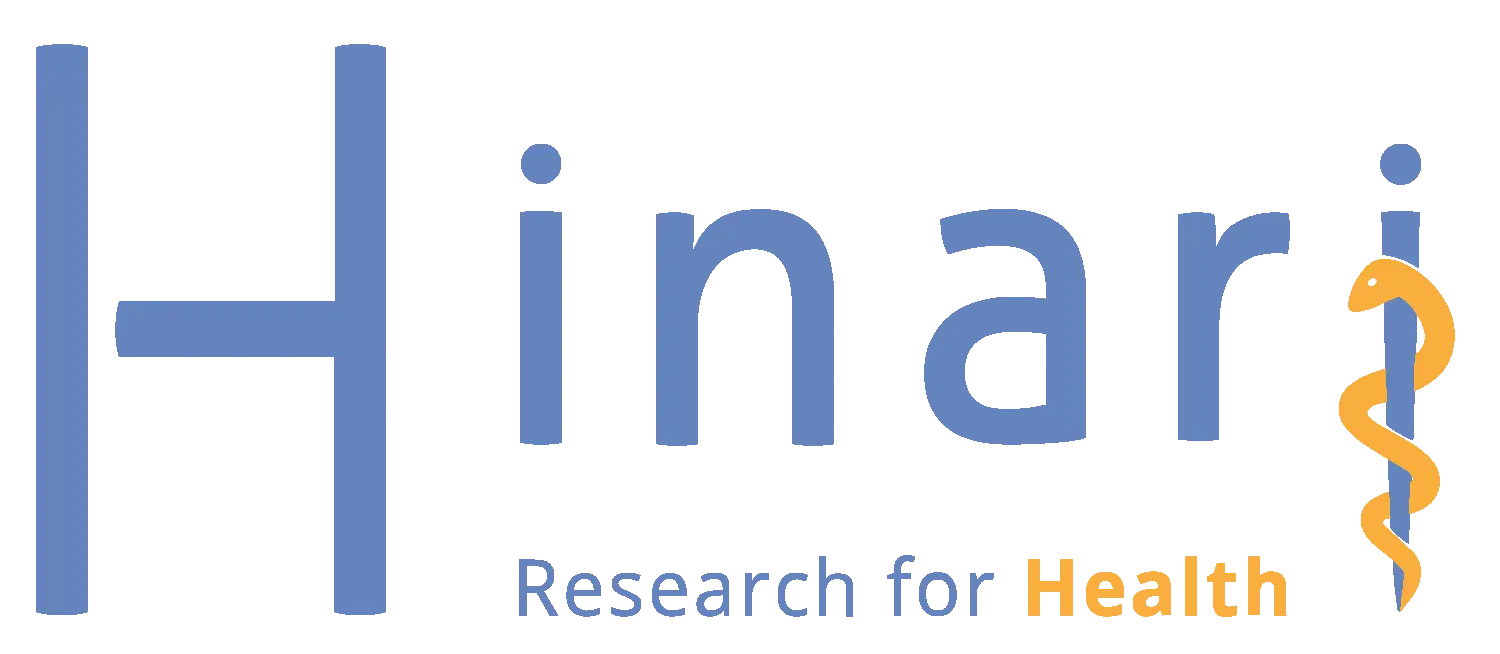Öz
Amaç
Koronavirüs hastalığı-2019 (COVID-19) hastalarının taburculuk sonrası post COVID dönemde de semptomlarının devam ettiği, solunum sistemi yetersizliklerinin ve fonksiyonel durum kaybının olduğu bilinmektedir.
Gereç ve Yöntem
Yoğun bakım servisinde yatmış ve taburculuk sonrası 1. ay ve 3. ay post COVID semptom sorgulaması yapılabilen 101 hasta çalışmaya dahil edilmiştir.
Bulgular
Taburculuk esnasında en sık semptomdispne (n=89) olmuştur. Bu semptom komorbidite, hipoksi ve hipertansiyon ile ilgili bulunmuştur. Üçüncü ayda 50 hastada en az 1 semptomun devam ettiği ve en sık devam eden semptomun ise halsizlik ve unutkanlık olduğu görülmüştür.
Sonuç
Hastaların risk faktörleri, komorbiditeleri ve yatış sürecindeki durumları göz önüne alınarak erken taburculuk ve fonksiyonel durumlarına göre de daha etkin rehabilitasyon ile taburculuk sonrası normal hayata geçiş süreci hızlandırılabilir. Böylece iş gücü kaybı önlenerek, maliyet azaltılabilir.
Anahtar Kelimeler: Uzamış COVID-19, dispne, yoğun bakım
Referanslar
- Halk Sağlığı Genel Müdürlüğü. Genel Bilgiler, Epidemiyoloji ve Tanı Aralık 2020, Ankara. Available at: https://covid19.saglik.gov.tr/TR-66337/genel-bilgiler-epidemiyoloji-ve-tani.html
- Zhu N, Zhang D, Wang W, Li X, Yang B, Song J, et al. A novel coronavirus from patients with pneumonia in China, 2019. N Engl J Med. 2020;382:727-33.
- Callard F, Perego E. How. Why patients made long COVID. Soc Sci Med. 2021;268:113426.
- COVID-19 rapid guideline: managing the long-term effects of COVID-19 NICE guideline; Published: December 18 2020.
- Mahase E. COVID-19: what do we know about ”long COVID”? BMJ. 2020;370:m2815.
- King’s College London. New research identifies those most at risk from ”long COVID. 21 October 2020; 06.12.2020 Available at: http://kcl.ac.uk/news/study identifies-those-most-risk-long-COVID.
- Long-term effects of COVID-19. Accessed on: 06.12.2020 Available at: http://cdc.gov/coronavirus/2019-ncov/long-term-effects.htm.
- Barman MP, Rahman T, Bora K, Borgohain C. COVID-19 pandemic and its recovery time of patients in India: A pilot study. Diabetes Metab Syndr. 2020;14:1205-11.
- Nehme M, Braillard O, Alcoba G, Aebischer Perone S, Courvoisier D, Chappuis F, et al. COVID-19 Symptoms: Longitudinal Evolution and Persistence in Outpatient Settings. Ann Intern Med. 2021;174:723-5.
- Bohn MK, Lippi G, Horvath A, Sethi S, Koch D, Ferrari M, et al. Molecular, serological, and biochemical diagnosis and monitoring of COVID-19: IFCC task force evaluation of the latest evidence. Clin Chem Lab Med. 2020;58:1037-52.
- Silva VZMD, Araújo JA Neto, Cipriano G Jr, Pinedo M, Needham DM, Zanni JM, et al. Brazilian version of the Functional Status Score for the ICU: translation and cross-cultural adaptation. Rev Bras Ter Intensiva. 2017;29:34-8.
- Keypoints | Evaluating and caring for patients with post-COVID conditions CDC. Available at: https://stacks.cdc.gov/view/cdc/107148
- Kreutz R, Algharably EAE, Azizi M, Dobrowolski P, Guzik T, Januszewicz A, et al. Hypertension, the renin–angiotensin system, and the risk of lower respiratory tract infections and lung injury: implications for COVID 19. Cardiovasc Res. 2020;116:1688-99. Erratum in: Cardiovasc Res. 2021;117:2394.
- Carfì A, Bernabei R, Landi F, For the Gemelli Against COVID. 19 post-acute care study group. Persistent Symptoms Patients After Acute COVID-19. JAMA. 2020;324:603-5.
- Tenforde MW, Kim SS, Lindsell CJ, Billig Rose E, Shapiro NI, Files DC, et al. Symptom Duration and Risk Factors for Delayed Return to Usual Health Among Outpatients with COVID-19 in a Multistate Health Care Systems Network - United States, March-June 2020. MMWR Morb Mortal Wkly Rep. 2020;69:993-8.
- Machado FVC, Meys R, Delbressine JM, Vaes AW, Goërtz YMJ, van Herck M, et al. Construct validity of the post-COVID-19 Functional Status Scale in adult subjects with COVID-19. Health Qual Life Outcomes. 2021;19:40.
- Knaus WA, Draper EA, Wagner DP, Zimmerman JE. Apache II: a severity of disease classification system. Crit Care Med. 1985;13:818-29.
- Ricks E. Critical illness polyneuropathy and myopathy: a review of evidence and the implications for weaning from mechanical ventilation and rehabilitation. Physiotherapy. 2007;93:151-6.
Telif hakkı ve lisans
Telif hakkı © 2024 Yazar(lar). Açık erişimli bu makale, orijinal çalışmaya uygun şekilde atıfta bulunulması koşuluyla, herhangi bir ortamda veya formatta sınırsız kullanım, dağıtım ve çoğaltmaya izin veren Creative Commons Attribution License (CC BY) altında dağıtılmıştır.






















